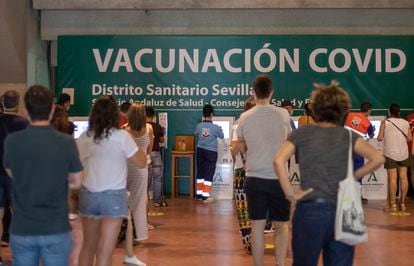Spain manages to meet the fourth objective set by the Government within the national immunization strategy against covid-19: to close the fourth week of July with 25 million people vaccinated with the full schedule.
The Ministry of Health has confirmed this Thursday that 52.8% of the population - specifically, 25,060,958 million people - has completed the vaccination cycle.
In the middle of the fifth wave, with infections on the rise and the cumulative incidence above 659 cases per 100,000 inhabitants, Spain is now immersed in vaccinating the youngest and repechage of citizens of the most vulnerable groups who have lagged behind.
More information
The Spanish exception: vaccination continues from strength to strength while in Europe it loses steam
Spain has already completed the vaccination of more than half of its inhabitants
The Government has met three of the four objectives set to date: only the previous goal - to reach June 20 with 15 million people with the complete vaccination schedule - remained in the air for just over 560,000 people, although that small delay has already been recovered. The rate of inoculation does not decrease and the communities puncture most of the vaccines that are arriving. Salvador Peiró, epidemiologist at the Foundation for the Promotion of Health and Biomedical Research of the Valencian Community (Fisabio), assures that "vaccination goes as well as it can with available vaccines." Spain has received about 56 million doses since the beginning of the vaccination campaign and the communities have injected, according to the latest report from the Ministry of Health, 94.6% of them. "Fewer doses arrive than in June,but progress is being made at a good pace ”, insists the epidemiologist
In June, Pfizer-BioNTech advanced shipments of doses planned for the fourth quarter and, between these and the shipments of the rest of vaccines, almost 19 million units arrived in Spain. So far in July almost nine million have been received. The communities puncture between 500.00 and 700,000 doses a day and, unlike the large European countries - such as France, Germany or Italy - where the rate of punctures has slowed or stagnated, Spain maintains the stable or upward trend. José Martínez Olmos, professor at the Andalusian School of Public Health, argues that in Spain there is little reluctance to the vaccine. “We are applying the vaccines that come to us because we have an accessible, universal system, and there is a great predisposition of the population to the vaccine. Although, beware, we still have to vaccinate the young population and,although it will surely follow the same rhythm, we cannot trust ourselves: we must insist on the benefits of the vaccine ”. More than half of the European adult population (53%, according to the European Center for Disease Control) has completed the vaccination regimen.
Spain is heading into the summer with the vast majority of its most vulnerable population fully protected.
The Spanish strategy prioritized punctures for older people and those with a higher risk of suffering a serious covid or dying, and, seven months after the first injections, coverage is almost total in those over 70 years of age.
84.4% of those in their sixties and 86.5% of the 50-59 age group also have the complete vaccination schedule.
Vaccination center installed in the Olympic Stadium in Seville, PACO PUENTES
The youngest groups remain ahead, which is where the virus is now being primed. Being the least protected sectors of the population and, at the same time, those that tend to have the highest levels of social interaction, the cumulative incidence - especially in twentysomethings and adolescents - is skyrocketing (1,863.77 and 1,586.66 cases per 100,000 inhabitants, respectively). For now, more than two-thirds of people between 40 and 49 years old are already fully vaccinated and almost 60% of those in their thirties have received the first dose. Several communities, in addition, have already opened appointments to people between 20 and 29 years old and adolescents.
“Vaccinating these groups will do,” Peiró tends, “but what we vaccinate today does not have sufficient protection for five weeks. And less with the delta variant circulating, for which the protection of the first dose is less. The wave must be controlled with the classic: contact reduction measures ”, he insists. Several communities have obtained the endorsement of justice to decree severe restrictions that affect fundamental rights, such as the curfew or the limitation of meetings. Catalonia and the Valencian Community have limitations in night mobility and also Aragon, Navarra and Asturias have asked their respective courts, reports Efe. In the Balearic Islands, social gatherings between 1:00 am and 6:00 am are prohibited when the accumulated incidence at 14 days exceeds 450 cases per 100.000 inhabitants and Murcia has limited informal meetings to groups of up to 10 people.
Martínez Olmos recalls that there is still a large group of people susceptible to infection and the priority must be to continue vaccinating.
In fact, although punctures have achieved high protection against serious illness and death in the most vulnerable groups, primary care continues to be overwhelmed with the rise of new infections and hospital occupancy has grown again: 7,618 people are admitted because of the covid and, of them, 1,240 are in intensive care (ICU).
This means that 13.5% of the critical places available in Spain are occupied by patients with covid, although this percentage is close to 40% in the case of Catalonia, where the care pressure is higher.
Group immunity
The last pending objective announced by the Government is to close August with 70% of the Spanish population vaccinated with the full schedule. This percentage was considered by experts and authorities as the threshold to achieve group immunity, a population coverage that would make it difficult for the virus to circulate. The epidemiologists consulted, however, now clarify that coverage of 70% will be insufficient to stop the pandemic. For starters, because the delta variant, which will become predominant in Europe in August, is up to 60% more transmissible. "The concept of immunity requires that it be homogeneous for it to take effect," says Martínez Olmos. “I doubt that 70% will give group immunity. What you have to do is reach 100% of the population that can be vaccinated ”.Peiró agrees and adds that "summer is not going to help much" to accelerate punctures and "high rates of infection will also delay vaccination coverage", since an infected person under 65 years of age has to wait six months after infection to get vaccinated.
Experts ask not to lower our guard and also to catch up with all the vulnerable people who have been left behind, a strategy that has already been implemented by several communities, such as Catalonia, which has deployed buses in some areas of the region to bring the population even closer. vaccination on the street and facilitate access to the system. Epidemiologists also warn Administrations to be careful with triumphalist announcements. Peiró alerts: “The messages that vaccination goes like a shot reduce the perception of risk. The underlying strategy has to be to immunize as many people as possible by the vaccine route, not by the wild route ”.







